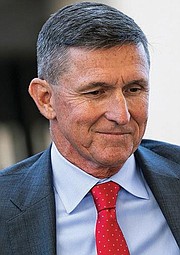WASHINGTON -- Accusing the Justice Department of a "gross abuse of prosecutorial power," a former mafia prosecutor and retired federal judge urged a court Wednesday to reject the department's attempt to drop the criminal case against Michael Flynn, President Donald Trump's former national security adviser.
"The government has engaged in highly irregular conduct to benefit a political ally of the president," wrote John Gleeson, who was appointed to a special role to argue against the Justice Department's effort to drop the Flynn case. He added: "Leave of court should not be granted when the explanations the government puts forth are not credible as the real reasons for its dismissal of a criminal charge."
But Gleeson also argued in a 73-page brief that Flynn should not be held in criminal contempt of court for lying under oath when he gave conflicting statements about his actions. Instead, he wrote, the federal judge overseeing Flynn's case, Emmet Sullivan, should take that behavior into account when imposing a sentence on Flynn.
The Justice Department "has treated the case like no other, and in doing so has undermined the public's confidence in the rule of law," Gleeson wrote. "I respectfully suggest that the best response to Flynn's perjury is not to respond in kind. Ordering a defendant to show cause why he should not be held in contempt based on a perjurious effort to withdraw a guilty plea is not what judges typically do."
The brief was the first response in the case from Gleeson, whom Sullivan appointed last month to help him analyze Attorney General William Barr's request to dismiss the case against Flynn, who had twice pleaded guilty to a charge of lying to the FBI.
A former federal prosecutor and judge for 22 years in Brooklyn -- best known for putting the late mob boss John Gotti behind bars and presiding over the trial of "Wolf of Wall Street" stockbroker Jordan Belfort -- Gleeson wrote that judges are empowered to protect their court's integrity "from prosecutors who undertake corrupt, politically motivated dismissals. That is what has happened here. The Government has engaged in highly irregular conduct to benefit a political ally of the President."
It will ultimately be up to Sullivan and potentially an appeals court whether to accept the Justice Department's motion to drop the case.
Flynn pleaded guilty, as part of former special counsel Robert Mueller's Russia investigation, to lying to the FBI about conversations with the Russian ambassador to the United States during the presidential transition period.
In January, Flynn filed court papers to withdraw his guilty plea, saying federal prosecutors had acted in "bad faith" and broken their end of the bargain when they sought prison time for him.
Initially, prosecutors said Flynn was entitled to avoid prison time because he had cooperated extensively with the government, but the relationship with the retired Army lieutenant general grew increasingly contentious in the months before he withdrew his plea, particularly after he hired a new set of lawyers who raised misconduct allegations against the government.
But the Justice Department filed a motion last month to dismiss the case, saying the FBI had insufficient basis to question Flynn in the first place and that statements he made during the interview were not material to the broader counterintelligence investigation into ties between Russia and the Trump campaign.
Officials have said they sought to dismiss the case in the interest of justice, upon the recommendation of a U.S. attorney who had been appointed by Barr to review the handling of the Flynn investigation.
Gleeson, who had co-written an op-ed article calling into question the legitimacy of Barr's intervention before Sullivan appointed him, offered a blistering critique of that rationale, saying "no federal prosecutor worth her salt" would adopt the "legally unsound" conclusion the Justice Department put forward.
"Pursuant to an active investigation into whether President Trump's campaign officials coordinated activities with the government of Russia, one of those officials lied to the FBI about coordinating activities with the government of Russia," Gleeson wrote. "It is hard to conceive of a more material false statement than this one."
"The government's ostensible grounds for seeking dismissal are conclusively disproven by its own briefs filed earlier in this very proceeding," Gleeson wrote. "They contradict and ignore this court's prior orders, which constitute law of the case. They are riddled with inexplicable and elementary errors of law and fact. And they depart from positions that the government has taken in other cases."
Flynn's defense team and the Justice Department have sought to bypass Sullivan altogether, asking the Court of Appeals for the District of Columbia Circuit to order him to dismiss the case against Flynn without any further review. They accused Sullivan of abusing his power by appointing Gleeson to offer counterarguments.
In a filing last week in that proceeding, a lawyer for Sullivan argued that he should be permitted to complete his review and said he would not necessarily adopt the findings of Gleeson. A three-judge panel is scheduled to hear arguments in that request Friday.
A federal appeals court is set to hear arguments Friday about Sullivan's refusal to immediately dismiss the case. Flynn's attorneys have asked the Court of Appeals for the D.C. Circuit to step in and force Sullivan to end the case. They have also accused the judge of being biased, arguing that he overstepped his authority when he did not immediately grant the Justice Department's request to dismiss the case.
Sullivan has separately scheduled arguments on the dismissal motion for July 16.
Flynn faces a sentence of zero to six months under his initial plea deal, although prosecutors at one point recommended that he get probation and no prison time.
Information for this article was contributed by Charlie Savage and Adam Goldman of The New York Times; by Michael Balsamo and Colleen Long of The Associated Press; and by Spencer S. Hsu of The Washington Post.

